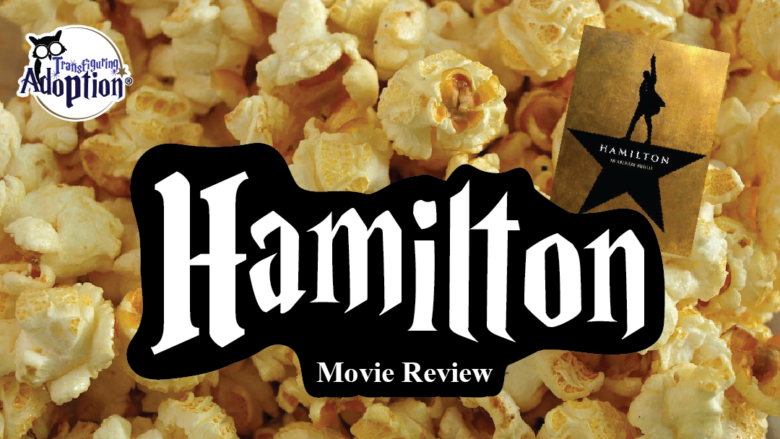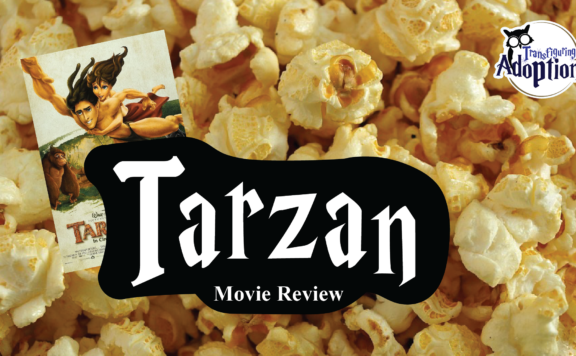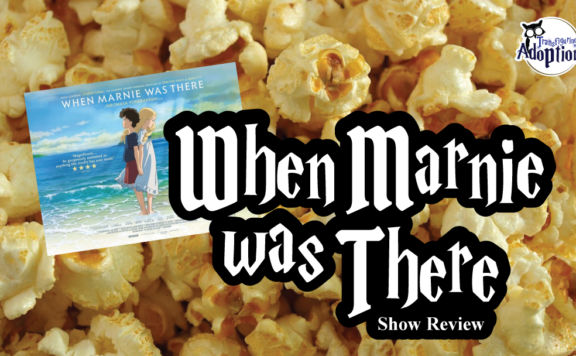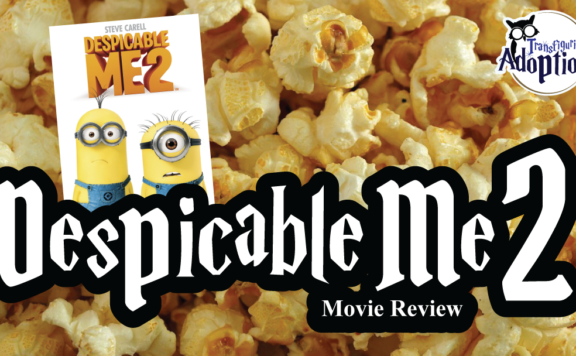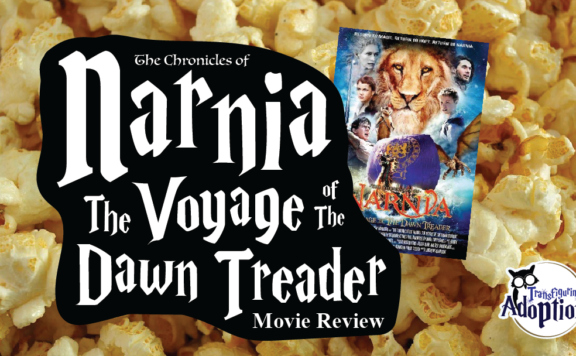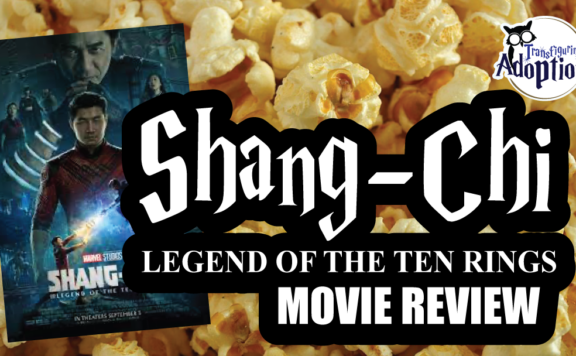Grade:
Transfiguring Adoption awarded this movie 3 Hoots out of 5 based on how useful it will be for a foster/adoptive family. [Learn more about our Hoot grading system here]
Movie Info:
From the Cover of Hamilton by Disney+:
“The filmed version of the original Broadway smash hit, Hamilton combines the best elements of live theatre, film and streaming in n astounding blend of hip-hop, jazz, R&B and Broadway. Presenting the tale of American founding father Alexander Hamilton, this revolutionary moment in theatre is the story of American then, told by America now.”
It feels like the whole world has been talking about Hamilton for years (and for good reason!) but viewing it has been largely unattainable for the average person given the limited availability and high price tag of tickets. That has all been changed with the recent release of a filmed performance making its debut on Disney+, just in time for the 4th of July weekend. While it lacks the energy you get with watching a live performance, they did an incredibly good job with the filming and edition of the production. There were times that I forgot I was watching a play rather than a movie!
The casting was incredible, and I felt like the characterizations were spot on for those figures I was familiar with (so I’m assuming it is also the case for those I didn’t recognize). Personally, I grew up down the street from Monticello and attended the University of Virginia so Early American/Revolutionary War history has been force-fed to me my entire life, but Hamilton adds an element of humor and fun to the subject while also maintaining historical accuracy with the story. The choice to have almost all characters (with the exception of King George) portrayed by POC actors and modernize the story with contemporary rap for the music makes the story accessible and relatable to a wider audience that’s more reflective of our current cultural make up, and also gets the viewer questioning and thinking about early American history in a new way.
While a great way to get younger generations more interested in history, the material and presentation are fairly mature and I would definitely recommend keeping to the PG-13 recommendation of the rating (though some more mature pre-teens may do alright with it). While two uses of f**k were edited out in order to get the Disney stamp of approval, pretty much every other swear word is used liberally throughout. The character of Hamilton is also frequently referred to (by himself and others) as a ‘bastard, orphan, son-of-a-whore’ with candor- a word-choice which may bother children with similar backgrounds. But overall the message is one of resilience as it shares the story of how someone with such a background was able to accomplish so much against all odds and can be a great starting point for conversations about the importance of what you do, not where you come from.
** Spoilers Could Be Ahead **
How Is This Relevant To Adoption & Foster Care?
Hamilton does not directly address adoption or foster care- however the title character (Alexander Hamilton) was orphaned at the age of 10 when his mother died, his father having abandoned the family years prior. This identity as a ‘bastard orphan’ very much shapes Hamilton’s behavior and choices throughout his life- even in the way he parents his own child. Aaron Burr is also an orphan, a fact that makes Hamilton immediately latch onto him.
Hamilton’s story is also one of overcoming the odds and not letting where he came from define who he is- a message that will likely resonate with children who have experience a difficult home life and trauma. Despite being orphaned at a young age Alexander studied and worked hard to get to America and then continued working his way up the ranks and fighting to be someone the world remembered. He never let his upbringing stop him from achieving his dreams and ends up George Washington’s right-hand-man, despite those telling him he would never amount to anything.
Discussion Points:
- Resilience
Alexander Hamilton overcame extraordinary childhood trauma to grow up to become one of our nation’s founding fathers, right-hand mand to George Washington himself during the war and the first Secretary of Treasury. At one point he states, “We rise, and we fall, and we break, and we make mistakes- but I’m still alive.” This sentiment is likely attractive to youth who have experienced trauma. They may feel like they’ve been broken and made mistakes but they’re still here and they’re still fighting towards a better life. Looking at someone like Alexander Hamilton and all he was able to accomplish despite his childhood situation is inspirational to others who are working to overcome similar circumstances. Other characters describe him saying, “No one has more resilience” and his wife remarks, “Look at where you started. The fact that you’re alive is a miracle.” And he isn’t just alive, he’s accomplished a great deal all at a relatively young age. This can be a great time to talk to youth about how they can work towards overcoming their own traumatic experiences and work towards building the lives they want. - Future Planning / Living in the Moment
Alexander Hamilton is the poster child for ‘living in the moment’. The people around him repeatedly say that he “writes like he’s running out of time” and that he never slows down. When he first meets Lafayette and the others and they start planning the revolution he says, “For the first time, I’m thinking past tomorrow.” Hamilton has spent his life up until this point living one day at a time. When a person experiences repeated trauma it tends to make their fight-or-flight response overactive and so their brain is in constant stress making split-second decisions for how to survive. This is an adaptive function when living through trauma because decisions are life or death. But once the trauma has ended, the brain continues to make decisions this way which can be detrimental as a person isn’t thinking things through fully. Hamilton’s trauma never fully ends given that he goes from a difficult childhood straight into fighting a war and for the most part tends to continue to live as if he’s running out of time. He says himself that he feels like death is always chasing him (“I imagine death so much it feels like a memory. When’s it gonna get me?”) This leads to him sometimes make reckless and rash decisions. Use this as an opportunity to discuss future planning with children and the ways in which Hamilton may not have always made the best choices due to the constant sense of urgency he felt. Let children know that while they were experiencing trauma their brain’s response was adaptive, but, now that they are no longer in a life or death situation on a daily basis, they would benefit from slowing down and thinking things through more. Help them come up with strategies of how to do this. - Healthy Vs. Unhealthy ‘Caregiver’ Relationships
The way leaders care for and deal with the people they govern takes on a relationship similar to that of a caregiver/child. In this show we see two examples of this that are strikingly different. One the one hand we have King George and the colonies as his subjects (pre-revolution). He gets angry at them for daring to stand up to him rather than being submissive to his every whim and feels betrayed by them. In a healthy relationship, a caregiver or leader should be proud and happy when a child demonstrates that they’ve learned enough to be on their own. Yes, it’s sad to say goodbye but it’s part of life. Instead, King George is petty and threatens the colonists to keep them in line, much the way an abusive parent might. He even mocks them, hoping they fail and tells them not to ‘come crawling back’ to him when they do, which he is certain will happen. On the other side of the spectrum, we have George Washington who spearheads the revolution and goes on to become the first president and leads for a number of years. Then, he makes the choice to resign his position, explaining to Hamilton that he will ‘teach them how to say goodbye’ and trust that they built a strong enough nation to keep going on its own. This can be likened to a healthy caregiver relationship- once a child is ready for more independence it’s the caregiver’s role to take a step back and let them spread their wings, but also be there to catch them should they stumble on the way out. Teaching children how to have a healthy goodbye is an important skill. There will be any number of goodbyes in a person’s life and while most will be painful on some level, they can also be healthy. For children who have experienced foster care or adoption, most of their experiences with separation so far in life has been extremely unhealthy. They are given up or removed from their biological parents, often in traumatic circumstances, and sometimes without any warning or goodbye. Therefore, it’s of extra importance to model what healthy goodbyes look like so when they experience the normal partings of life (end of romantic relationships, moving, death, etc.) they are better equipped to deal with it in a less traumatic way.
Cautionary Points:
- Language
In order to get a PG-13 rating, two occurrences of the work f**k were left out of the movie (though if your children look up the soundtrack, expect to hear those in the lyrics!). There is one instance still in the film and pretty much any other swear word you can think of is used pretty liberally.There is also pretty frequent use of somewhat derogatory terms to refer to Hamilton and others (Bastard, Orphan, etc.) Those these terms are used in line with the historical context of the time, but it still might be upsetting for children to whom those words could apply. - Sexual Content
The biggest occurrence of this is when Hamilton is having an affair in the middle act of the film (both he and his partner are married to other people) and he claims that he ‘can’t say no’ and ‘can’t help himself’ which are problematic messages to be sending to youth. They have a fairly steamy dance number together. Alexander also frequently flirts with his Sister-in-Law, Angelica, after he is married. We also hear about Burr engaging in an affair with a married woman (though not shown on stage). Hamilton’s affair is especially a pretty major plot point during the second half of the show. There are also several references to ‘getting beneath a corset’, though they may go over some children’s heads, especially if they are unfamiliar with period clothing. - Loss of parents/caregivers
Hamilton’s father abandoned his family when he was fairly young, and shortly thereafter he loses his mother to illness only to move in with a cousin who commits suicide. He is left to essentially raise himself. None of these occurrences are shown on stage, but Hamilton and others talk about them frankly throughout the show. We also find out that Burr’s parents are dead leaving him an orphan as a young man, though it’s not clear how young he was when it happened and is only mentioned briefly. - Character Death
Hamilton’s son Phillip is killed in a duel defending his father’s honor and dies in the arms of his parents in a pretty emotional scene. We see both Hamilton and Eliza mourning his death and struggling with the loss. Later, Hamilton is shot by Burr on stage as well. There is mention of other character deaths as well, but they are not shown on stage. - Violence
The show is about the American Revolution/War so that is an overarching theme. We don’t see a ton of character-on-character violence on screen other than several gun duels (two of which result in the death of Hamilton and his son). There are a number of musical numbers where characters dance with weapons (mostly rifles/bayonets) and there is often talk about fighting and some of the characters glorify this violence talking about how they long for war or are eager to prove their worth on the battlefield. - Natural Disaster
It’s not shown on stage, but Hamilton mentions a few times that a hurricane destroyed his home and his town when he was young, and he lost everything. This may be upsetting for children who have lived through a hurricane or other natural disaster that displaced them. - Substance Use (Alcohol)
We both see and hear about the characters drinking pretty frequently, though it is shown in a historically accurate context that is reflective of social norms of the time. - Abusive ‘Relationship’
While not a traditional parent/child role we get some glimpses of the US colonists and their relationship with King George through the latter’s musical numbers. The description of this relationship somewhat mirrors an abusive relationship. George talks about all he’s done for his subjects and his frustration that they are independent thinkers and not submissive enough. He also talks about doing things like killing their friends and family and sending army battalions to ‘remind them of their love’. While this is all done as a comedic interlude it might be problematic to children who have experienced abusive caregivers who may have threatened them with violence to keep them in line.
Discussion Guide:
- Hamilton gets upset when he first tries to enroll in college in the US saying, “He looked at me like I was stupid. I am NOT stupid.” Have you ever had someone look at you or treat you like you were less because of who you are or your background? How did it make you feel?
Caregiver Note: Often when children have a background of being in the foster care system they might feel like their peers and others judge them based on their past. It’s likely they will empathize with Hamilton here and feel that he had a right to be angry. Just as Hamilton valued his intelligence above most other qualities, hearing your children’s response to this question might give you some insight to the things they value about themselves and in which areas they feel misjudged. - When Hamilton first meets Burr and then the others he tells them “I’ve never had a group of friends before- I promise I’ll make you proud”. How do you think this affects his choices?
Caregiver Note: Often when children have been through foster care, they have changed living situations at least once, sometimes frequently. This can make it extremely difficult to make friends. Because of this they may not understand who to trust and may easily fall in with the wrong crowd- craving acceptance they may accept it the wrong places, whether that’s in friendships or romantic relationships. In Hamilton’s case it worked out, though one of these ‘friends’ he makes upon his arrival in NY (Burr) ends up later being the one who killed him. Talk with children about how to read social cues and how to know if and when someone should be trusted so that thy might make good decisions in choosing their relationships. - When they first start plotting the revolution Hamilton realizes he’s been talking loudly, and it may not be the best strategy. He apologizes saying, “Sometimes I get over excited and shoot off at the mouth”. What does he mean by this? How does Hamilton’s ‘shooting off at the mouth’ help or hurt his cause? Have you ever experienced something similar?
Caregiver Note: One of the lingering effects of trauma can be poor impulse control. When you live your life in a constant state of ‘fight or flight’ making a quick choice of what do to without taking the time to think it through can literally mean the difference between life and death. However, when the circumstances aren’t so dire, it can be of great benefit to think decisions through more carefully. This can be a place to start a conversation about when to act first and when to think things through first and the benefits of doing so. Talk about the ways Hamilton’s impulsivity helped or hindered him in different situations. - Hamilton frequently says, “There’s a million things I haven’t done, but just you wait!” What would you put on your list of things you’d like to do?
Caregiver Note: It can often be hard for children who have been through trauma to think about the future. As with the previous question, when living every moment as ‘fight-or-flight’ and trying to survive one day to the next it doesn’t leave much room for thinking about what their life might look like far into the future. Together, talk about things they might like to see or do and make a ‘bucket list’. This can range from serious life milestones (going to college, getting married, etc.) to fun things (seeing a play on Broadway, going to the beach, skydiving). It’s important to get kids thinking about the future and what it might hold for them so that they can being to plan for the kind of life they want to have. This activity can be a lowkey way to do that. - When we meet the Schuyler sisters, Angelica and Eliza talk about the opportunities that the revolution will bring them, while Peggy is sad and worried about the violence that she expects is coming. Why do you think they feel these different ways? Which view do you think you’d have?
Caregiver Note: Both of these points of view are valid- a revolution will bring opportunities and also violence. Hearing what your child thinks about these different opinions may give you some insight into what they value or fear. If a child has grown up with a lot of violence in their life, they might relate more to Peggy’s worries. However, they may also understand and relate to the ideals of wanting things to get better and knowing a revolution will help with that. - Burr says, “I am the one thing in life I can control.” What do you think he means by this? Do you agree?
Caregiver Note: Psychologists will say that all anxieties can be boiled down to ‘fear of loss of control’ in some capacity. Children in foster care will often feel like they don’t have any say in their own lives and no control over where or with whom they live. They likely will agree with Burr’s statement that everything around them feels out of control. But it’s important to talk about how we can’t control the actions of others- all we can do is control our own actions. This can be a time to talk about strategies for coping with anxiety when everything feels out of control- such as meditation/mindfulness, grounding exercises, etc. - George Washington seems to almost be a sort of ‘father figure’ to Hamilton. However, in one scene we see Hamilton get increasingly angry as Washington continually calls him ‘son’, shouting, “Don’t call me son!” and “You’re not my father”. Why do you think Hamilton feels so strongly about this?
Caregiver Note: Terms of endearment like ‘son’ might seem like a casual thing to some people, but for those who have ever lost a parent (whether through death, adoption, etc.) deciding how and when to give names to relationships carries a lot of weight. Deciding to call someone other than a biological parent ‘mom’ or ‘dad’ is a really big decision. Everyone gets there in their own way and time, and it’s not an issue that should be forced or decided by anyone except the child themselves. While Hamilton may think of Washington as a father-figure, being called son by him is likely also a painful reminder of what he is missing from his own biological father. Children will likely have varying degrees of opinions here depending largely on their relationships with their own biological and foster/adoptive parents. Some might like being referred to as your child, rather than foster child, but some might take offense at this because, like Washington, you aren’t their biological mother/father. It’s important to have discussions about this when a child comes into your home regarding how they’d like to be referred to, and to make sure you respect whatever their choice might be. - Activity: Letter Writing
Caregiver Note: Alexander Hamilton is known for his writing abilities and in the show he claims that in many ways he ‘wrote his way out’ of various situations. Educating himself and honing his writing craft helped him get to America and into a good college. He wrote defenses of the constitution in The Federalist Papers, and even his romance with his wife Eliza was largely through letter writing. Writing can be a very cathartic coping mechanism and there was a time when that was the main way of communicating. Have children pretend they don’t have access to the internet/phones/etc. and have them write a letter to a friend or family member. If they don’t feel comfortable with actually sending letters to a person, give them the option to write the letters as a journal, something not meant to be sent to anyone. - From the point they meet it’s obvious that Hamilton and Burr have very different life strategies. Burr says to “talk less, smile more. Don’t let them know what you’re against or what you’re for.” On the other hand, we have Hamilton who says, “If you stand for nothing, what will you fall for?” Burr frequently changes sides to whatever best fits with his current goals, whereas Hamilton lives and dies by his beliefs. Because of this he even chooses to back Jefferson (who he claims to hate) in the election rather than Burr because “at least he has beliefs”. Who do you think has the better strategy? Which one do you think you’re more like?
Caregiver Note: As Hamilton is the hero of the story, we are meant to take his side in this argument, and many will. However, there are valid points to both of their strategies. Children might relate to either one of the characters, which can give you insight into the way they think and their behavior. Burr’s approach can be a defense mechanism- if you don’t let anyone know how you really feel, it’s harder for them to hurt you. Sometimes if you sit back and watch and don’t speak your mind, then you can blend into the background which might feel safer. On the other hand, some children who have experienced abuse may have very developed sense of ‘right’ and ‘wrong and be very outspoken about defending their beliefs and ‘fighting back’ when someone disagrees. There is a time and a place for both approaches. - All during the show Hamilton states that he’s “not throwing away my shot” and yet in the end when it comes down to it in his duel with Burr he does exactly that- he aims for the sky rather than Burr. Why did he choose to do this?
Caregiver Note: Hamilton follows the same advice he gave his son for his duel- to aim for the sky. There’s no right or wrong answer here, as historical scholars still debate this point to this day (as well as if he really did aim for the sky or not). But it could lead to an interesting discussion of why he might have made the choices he did in the end, and the differences between literally and figuratively taking or throwing away his shot.
About the Author: Jenn Ehlers
Jenn is a central Virginia native who received her BA in Psychology from the University of Virginia in 2012. Since then she has worked for a local mental health agency and the Department of Social Services in various capacities and has been involved in her community’s efforts to create a Trauma Informed Network. Currently Jenn works in vocational rehab and mentors youth in foster care. When she isn’t working, Jenn enjoys writing stories, anything and everything Harry Potter, and spending time with her niece and nephew.
**Transfiguring Adoption is a nonprofit organization seeking to nurture growth in foster and adoptive families by giving a HOOT about their families. Transfiguring Adoption does not intend for its reviewers nor its review to be professional, medical or legal advice. These reviews and discussion guides are intended to help parents to better be able to connect and understand their children who come from traumatic backgrounds.
